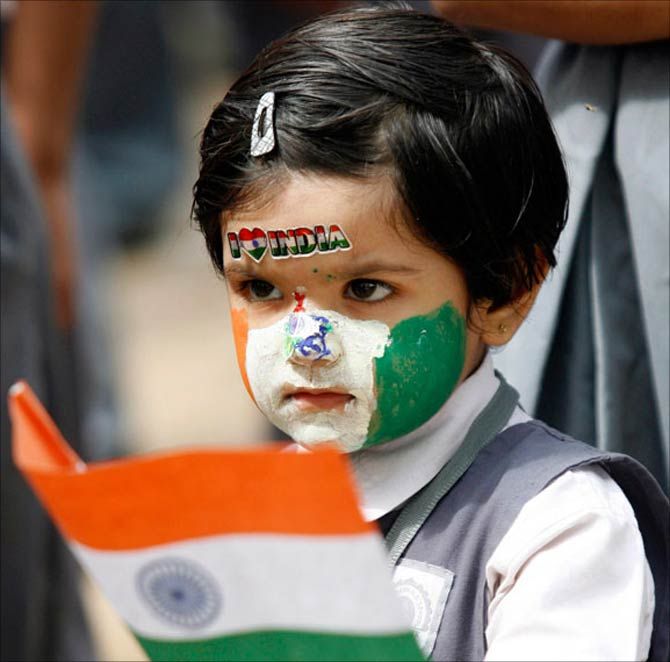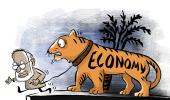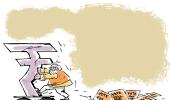Fifty years on, unemployment is as low as it was in the early 1970s, nationalism and self-reliance is still winning elections, and bad policy is still being sold as "at last something being done for the poor", points out Mihir Sharma.

It is perhaps easy for us today, in a country that has been socialist since independence -- and which, in spite of a quarter century of liberalisation, seems to be growing more socialist every year -- to imagine the alternative possibilities that existed 50 years ago, as we nationalised the banks.
We know, in retrospect, that India was condemned to increasing statism, disruption, and authoritarianism in the years after 1969 -- and that Indira Gandhi's style of inner-party autocracy, her hawkishness, and her left-wing populism would eclipse her father's social-democratic liberalism as the preferred archetype for Indian political leadership.
But it is easy to imagine how it could have turned out differently.
What in my book Restart I called "India's great leap left" was by no means a pre-ordained outcome.
The real reason that the banks had to go was political: the nature of Indira Gandhi's rivals in the Congress.
Men like her finance minister, Morarji Desai, were by conviction and background sympathetic to India's embattled capitalists; for the Indira bloc in the Congress, it seemed that there was a dangerous nexus of support and financing that linked the Syndicate, the old corporate houses, and the banks those houses seemingly controlled.
Many in the Syndicate were quite clear about where they stood on economic policy.
The growth of the Nehru years had dissipated in the mid 1960s, chased away by the twin spectres of famine and war.
The public sector, appropriating an ever greater share of national resources, was no longer above criticism.
So it was at the fateful 72nd Congress session in 1969, at which the party's president, S Nijalingappa, was scathing about the public sector: 'We must see that big industries are not established in the public sector without due regard to demand and the capacity to produce... I am told that some industries in the public sector are so badly managed that the full capacity is not utilised and that they are run on very unscientific methods.
'I believe that industries, by whomsoever established, should be encouraged.
'If private industries misbehaved or made undue profits they can both be punished and controlled through fiscal measures.'
He then produced a much-quoted summary of the dangers of the licence-permit raj: 'Where there are controls and licensing, there is always corruption -- and the sooner we do away with licensing and controls, the better it will be.'
When Indira Gandhi replied to her party president's speech, the papers noted that she repeatedly stressed the need for greater State control and for socialism, while Nijalingappa had not used the word "socialism anywhere in his 6,000-word address".
And here were the prime minister's responses.
First, the importance of self-reliance through the public sector was "amply demonstrated by the glorious performance of the armed forces during the conflict with Pakistan".
Second, private industry was not interested in long-term projects with a doubtful yield.
Third, she warned that a few probes into the private sector would reveal a great deal of corruption.
Fourth, delayed approvals and inefficiency in the licence-quota raj came only to ensure "nothing was done that compromised India's sovereignty".
And, finally, the prime minister insisted we must fight foreign influence.
Really, this speech seems like it could have been delivered by an Indian prime minister yesterday, and it possibly was.
When, after the presidential election that summer brought tensions to a head, the prime minister sought a reason to dismiss Desai, she used the long-standing demand for bank nationalisation as a reason.
As late as July 9, P N Haksar in his famous note to the prime minister was still talking about "social control" of banks.
But, by the 19th, the banks were nationalised and Desai was out.
Later that year, the MRTP Act was passed and our long grey bureaucratic nightmare began.
Haksar had warned: 'In these conditions, the competitiveness of market economy, the struggle to get the good things of life in education, health, jobs becomes very intensely acute.'
Nationalisation did not solve these problems, nor did the MRTP or any other tyrannical instrument of State control.
But Indira Gandhi convinced people they did, and the media helped her.
Here's another paragraph that could have been written yesterday: 'After the prime minister took away 85 per cent of the banking system, the media reported that "poor people danced in the streets".
None of them had ever been inside a bank... but they felt that at last something was being done for the poor and the rich were being put in their place.' [Inder Malhotra, in The Times of India.]
Such misunderstanding of the effects of populist policy can continue to be electorally potent for quite a while.
David Lockwood quotes C P Bhambhri on the 1971 election: 'A cobbler told me that if Mataji had not nationalised the banks, my son would not have become a watchman for the government.'
Fifty years on, unemployment is as low as it was in the early 1970s, nationalism and self-reliance is still winning elections, and bad policy is still being sold as "at last something being done for the poor".
Truly, India is a timeless place.












 © 2025
© 2025